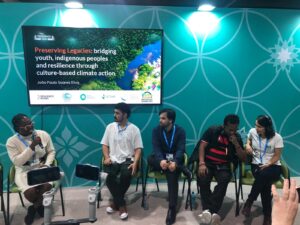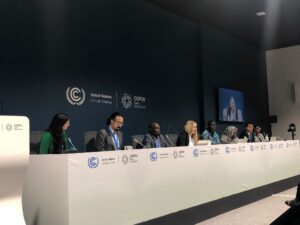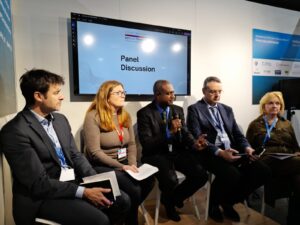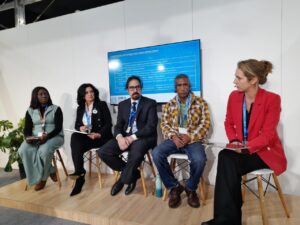COP29, held from November 11-22, 2024, in Baku, Azerbaijan, will spotlight climate finance and urgent action against global warming. Leaders, NGOs, and civil society representatives will push for updated climate plans, aligned with the Paris Agreement, to limit warming to 1.5°C. GNDR and its members are actively participating, urging inclusion and climate justice, particularly for vulnerable communities disproportionately affected by climate impacts.
GNDR staff and members are in Azerbaijan representing the voice of civil society. Follow their updates from Baku:
Monday 11 November 2024
- COP29 kicked off with the opening plenary at 11 am and the usual discussions between Member States to decide the agenda for the two weeks.
- Meanwhile, side events and Pavilions started in earnest
- A key pavilion and space for GNDR and its members is the Resilience Hub. This hub provides a home for policy discussions on adaptation, DRR and resilience – this is particularly important given the lack of attention to these policy areas in within the COP negotiations.
GNDR has helped curate the Resilience Hub programme this year. The programme is divided into six challenges and GNDR has co-led challenge 6 with Fundación Avina. Challenge 6 focuses on responding to the question: How can we ensure the incorporation of culture and Indigenous and local knowledge at every level of decision making?
Challenge 6 is a series of three events. The first event took place today and was titled: Effective Youth Inclusion for Climate-Resilient Communities: Empowering Youth for Local Action Decision Making. It was led by:
- IPAM
- Youth Climate Council Global Alliance (which is part of GNDR member GAYO)
- Climate Heritage Network/Preserving Legacies
This event highlighted the role of indigenous peoples, culture and youth in effective resilience building – as well as the importance of hope and moving beyond words to action.
Read more about the Resilience Hub.

Resilience Hub event: Effective Youth Inclusion for Climate-Resilient Communities: Empowering Youth for Local Action Decision Making
- In the afternoon GNDR, the Nadam Foundation and IAITGTF held an official UNFCCC side event: Financing Loss & Damage at the Local Community level.
Speakers:
- Becky Murphy (Moderator) GNDR Head of Policy
- Adessou Kossivi, Climate Lead for GNDR
- Azmat Khan, Foundation for Rural Development & GNDR Member
- Fatima Ahmed, the founder and director of Zenab for Women in Development (ZWD) in Sudan
- Gideon Sanogo, Pastoralists Indigenous NGOs
- Miriam Ndow Jorju, Government of Gambia
- Soumyadeep Banjerjee, IOM
- Mary Friel, IFRC climate policy lead

GNDR’s UNFCCC side event: Financing Loss & Damage at the Local Community level
This event stressed the need for direct access to funding for local organisations and indigenous groups. It was raised how the current financial architecture does not allow for this and continues to be dominated by powers in the Global North. As we look forward to Loss and Damage funding – we need to make sure that this funding materialises, but we also need to make sure that this funding learns from the challenges of the past and listens to the perspectives of local communities and groups. We need funding to be decolonised. It was a dynamic event that demonstrated the strength and power or local voice and how integral it is to effective climate action.
Tuesday 12 November 2024
GNDR’s Executive Director, Marcos Concepcion Raba was invited to speak at the SEndai Stakeholder Engagement Mechanism (SEM)’s session: Whole-of-society approach for early warning and early actions at the Parliamentary Pavilion.
- He highlighted GNDR’s project Local Leadership for Global Impact (which was implemented in partnership with Diakonie Katastrophenhilfe and funded through them by the German Federal Ministry for Economic Cooperation and Development (BMZ) and our initiative, Localising Climate Projections, in Zimbabwe. This initiative showed how to bring together local actors – communities most at risk and the civil society organisations, local leaders and local government units that represent them, in climate change projection processes, including forecasting, climate information production, and early warnings.
- He also highlighted the need to strengthen partnerships between local and national actors, especially the national meteorological office and national climate-research institutions to stay abreast of emerging scientific understanding and strengthen preparedness and adaptive capacities with local communities.

GNDR Executive Director, Marcos Concepcion Raba; Abraham Nasak, Director General, Ministry Of Climate Change, Govt of Vanuatu; Loretta Hieber-Girardet, Chief, Risk Knowledge, Monitoring and Capacity-Development Branch, UNDRR; Michelle Higelin, Executive Director, ActionAid Australia; and Gianpoalo Balsamo, Director, Infrastructure Department, WMO on the SEM’s Whole-of-society approach for early warning and early actions panel.
The team also met with the Swiss Agency for Development and Cooperation (SDC). Under discussion were:
- The localisation of climate change actions and how governments could champion localisation with engagement with local communities.
- SDC priorities on the NCQG and loss and damage
- We also shared members work and their engagement during COP29.
Wednesday 13 November 2024
Localising loss and damage: Local voice in climate finance
Day three in Baku started with the GNDR hosted session: Localising loss and damage: Local voice in climate finance at the Climate, Peace and Transboundary Resilience pavilion.
The session provided a space for GNDR members from the Global South to share their expertise, experience and recommendations on the loss and damage of those living on the frontline of risk. This included a specific focus on those living in conflict-affected and fragile states. During the session, GNDR members shared local stories about their experience with the impacts of climate-induced disasters, loss and damage incurred by the communities and local actions in building resilience.
- Zakir, a GNDR member from Bangladesh, highlighted the importance of engaging children in protecting the water resources at the local level and how a community could fail in building sustainable solutions due to lack of resources, lack of capacity and lack of government support.
- Marie Therese Seif, a GNDR member from Lebanon, highlighted the impacts on the lives of communities due to conflict and climate change. This is leading to scarcity of water due to climate-induced risks, making it impossible for farmers to cultivate their crops, while displaced communities struggle to secure even basic necessities.
- Azmat, a GNDR member from Pakistan, shared the successful nature-based solution to mitigate flooding. This was done by bringing together science and traditional knowledge.
- Gloria, a GNDR member from Nigeria, discussed the impact on women and youth. She shared that we should keep hope and work towards the mitigation of disaster risks.

GNDR members on the panel of our side event: Localising loss and damage: Local voice in climate finance
The climate-conflict-gender nexus: Key considerations for Loss and Damage in FCAS at COP29 and beyond
Women’s Resilience in peril: Surviving loss and damage in conflict-affected DRC, Nigeria and Somaliland
- GNDR head of policy, Becky Murphy, moderated this session, hosted by ActionAid at the SHARE Hub
- The event highlighted how these countries received the least climate finance and that women especially are confronted with loss and damage impacts.
- Conflicts caused by climate change, a lack of resources, and land are all causes of migration.
- Women and girls experience non-economic losses, including gender-based violence.
- Panellists also spotlighted the experiences of migration and risks faced by women in displacement settings.
Economic challenges
- Livelihood losses: drought and conflict create a dependence on humanitarian aid, which can often be unreliable and humiliating
- Women face financial instability
- And an increase in Gender-based violence, as well as impacts on health and education.
- Barriers facing women-led initiatives: lack of capacity, and lack of training
Loss and damage exacerbate existing tensions and vulnerabilities
The second part of the session took a close look at the nexus of climate, conflict and gender.
High-level Event Convened by the United Nations Secretary-General on Delivering Early Warnings for All and Addressing Extreme Heat
Marcos Concepcion Raba, GNDR’s Executive Director, was invited as observer to the High-Level event on Early Warning for All, chaired by the UN SG, Mr. Antonio Guterres. The high-level event took stock of the implementation of EW4All and the global response to the call to action on extreme heat, with the participation of leaders from developed and developing countries, financiers, private sector and CSO representatives.
Meeting with FCDO
The GNDR team met with the UK government’s Foreign, Commonwealth and Development Office (FCDO) and exchanged about the GNDR work especially about the Locally Led Humanitarian Solutions project, which is funded by the United States Agency for International Development (USAID) – Bureau for Humanitarian Assistance.. The team also discussed how to build synergy between GPDRR and COPs, and how to feed into the G20 discussion and process.